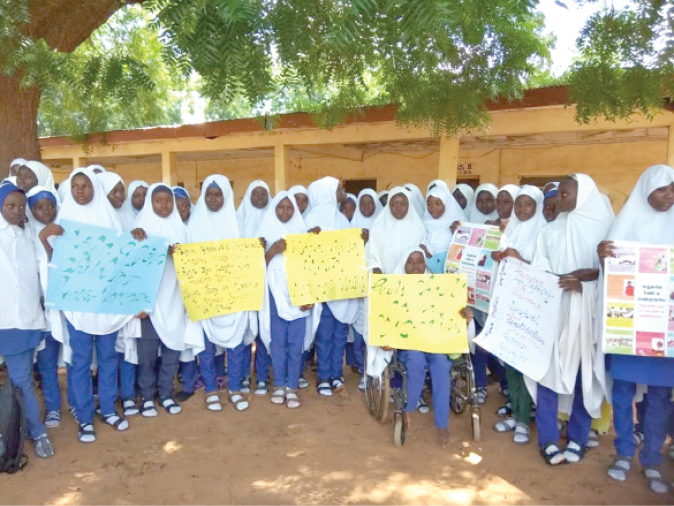Ummu Aliyu connects with other teens and mentors in a girls’ safe-space which seeks to create a physically and emotionally safe environment for them to build their knowledge and skills, unlock their potentials, enhance their well-being and prospects.
UNICEF statistics indicate that each year, around 12 million girls under 18 will be married and that worldwide around 15 million girls aged 15-19 have experienced forced sex in their lifetime. It adds that based on data from 30 countries, only 1% of adolescent girls who have experienced forced sex reached out for professional help.
Approximately 2 million girls under age 15 become pregnant every year, UNFPA says, adding that approximately 16 million girls aged 15 to 19 give birth each year.
UNESCO’s Institute for Statistics states that globally, more than 130 million girls are not attending primary or secondary school.
But the World Bank notes that for every extra year a girl spends in school, her income can increase by 11 per cent.
The Girls’ Safe Space debuts in Sokoto courtesy ActionAid’s Breaking Barrier project that aims to ensure public education systems are more responsive to all children, and especially the needs of girls and marginalised children.
Kyauta Giwa of ActionAid Nigeria revealed that the organisation is implementing the project in two states in Nigeria – Sokoto and Lagos – with a total of 10,500 girls and 600 boys and 30 schools.
In Sokoto the project, which targets 5,250 girls and 300 boys, is being executed by ActionAid Nigeria’s partner, Rural Women and Youth Development (RUWOYD).
“The goal is to ensure gender-responsive and inclusive education that allows access for girls and persons with disabilities and guarantees maximum school enrolment and retention and completion rates for all children of school age,” she stated.
Giwa identified poor school infrastructure, violence and discrimination as barriers to free, quality, publicly funded, inclusive public education.
However, at the Girls’ Safe Space, issues of girl’s rights, education and social ills such as drug abuse, gender-based violence are among others come to the fore.
The messages are empowering for Ummu. Over the past months, she has been able to develop a sense of a positive self-image. “We are allowed to bare our minds, and we feel significantly safe and comfortable in that space,” she declared.
It is not just about talks as participants at the safe space also acquire some skills such as knitting, baking, tailoring and soap making. “We have made some items, and we will sell them to boost our finances,” Ummu reveals.
Hajiya Zainab Shehu Umar, a Chemistry teacher at Government Girls Secondary School, Dogondaji, Sokoto, is a mentor/facilitator of Safe Space at the school where 40 girls are beneficiaries.
“We assist the girls to build their knowledge and skills and support in tackling issues of concern.”
At Government Girls Day Secondary School, Tambuwal, Mrs Charity Ikechukwu is a mentor and Mathematics teachers. She explains: “Safe space was introduced here in December 2018. We meet every Wednesday during the break period for 45 quality minutes.”

 Join Daily Trust WhatsApp Community For Quick Access To News and Happenings Around You.
Join Daily Trust WhatsApp Community For Quick Access To News and Happenings Around You.


